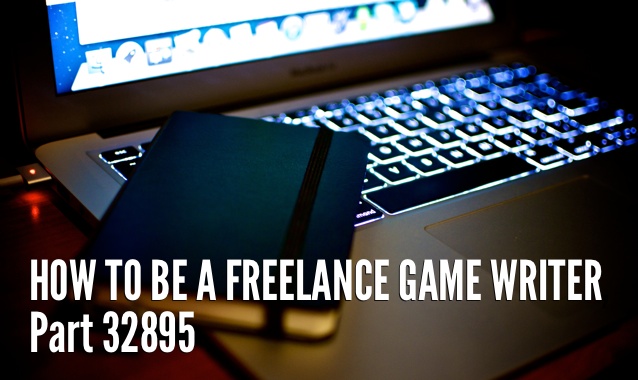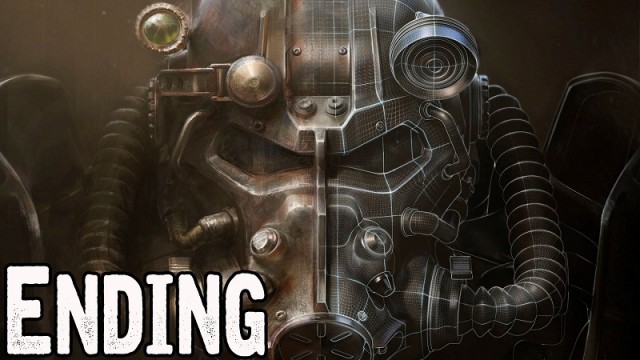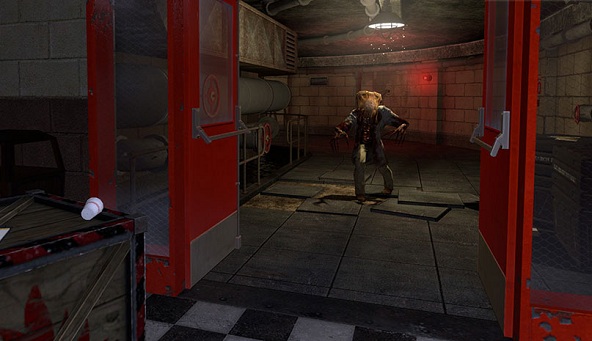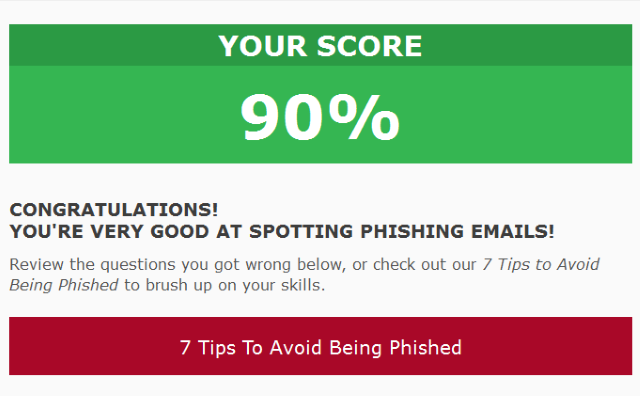


I admit, I wasn't sold on Nathan Meunier's Kickstarter—at least, not until I watched the accompanying video, in which his rocket-powered head flies out of his own empty neck. (Oh, just watch it.)
Meunier's proposed book, Up Up Down Down Left Write: the Freelance Guide to Video Game Journalism, promises to help newcomers navigate those roiling waters I like to call "too many writers, not enough jobs." And although Meunier's book proposal is strong enough to woo an actual, big-time literary agent, I certainly respect his can-do attitude toward self-publishing.
Maybe the Internet is deluged in writing and journalism tips right now, but it's only because people keep scrambling to read them. Even the University of Iowa—home to the most prestigious creative writing department in the nation—now offers a games journalism class.
But good freelance writing is fostered by healthy competition, and that is why I have decided to undermine Meunier's noble Kickstarter with a how-to guide of my own.
To write it, I contemplated everything I've learned in the last seven years. That part took a couple minutes. Then I belched out these ten great tips.
I love to tell people to believe in their dreams, to pursue their bliss with every last, threadbare fiber in their stringy little hearts.
Do you know what's better than following your dream? Eating. Sorry, mom: freelancing is the dumbest decision I ever made.
Well, maybe you don't believe in "eating." Or maybe you are a sociopath who doesn't do well in an office setting. Maybe other people set your teeth on edge. If you have ever thought to yourself I have to write exactly what I want to write, on my own terms, or else I will die, you are a big baby. Freelancing is for you.
Actually, I never say this. That's because I believe that passion is enough, that good writing can be taught. Anyone can communicate conversationally, effortlessly. Anyone can learn the secret formula behind a sentence. But the truth is, you don't have to be a good writer to get a freelance gig. You don't even have to be an adequate writer. You can be absolutely terrible.
There will always be somebody else to do your job, faster, worse, and for less money. In fact, that hack writer will jump at the chance. And if you're the slow, longwinded writer that I am, being "decent" is your only advantage against those twerps.
If you're a full-time writer, you're poor, okay? You already know that time is your most precious resource.
One day I suddenly decided I wanted to be paid double what I was already making, and I earnestly began to consider freelancing full-time. So I estimated the amount of work I'd need to take, along with how much time I could conceivably afford each article, column, or review. Once I had a plan in place, I resigned from a job I loved.
Now I find myself weighing the value of any gig before saying yes. Is the time commitment commensurate with the pay? Is this job a time-sink in disguise? If the gig barely pays, is the prestige worth it? Is this job for a friend? Do we really, really like this friend?
Be warned: your math is never correct. Something always goes wrong.
If you're a decent writer, you're probably a good reader. Perhaps you have a couple favorite writers already—Clive Thompson or Tom Bissell or Leigh Alexander or whoever. Follow them! Follow them on Twitter. If they have Tumblrs, follow those, too. If you aren't a morning person, spend your mornings reading. If you aren't a night person, read at night.
When your favorite writers point to great articles by other people, go read those, too. Then follow those people. Read constantly. Read in bed, on the toilet, at the beach. Install Instapaper and Reeder and Kindle on your smartphone. Don't drop your smartphone in the bathtub.
Next, announce what you've read. Anytime something is good, plug it. Advocate it. This isn't about "social collateral" or "schmoozing"; it's about curating. Having good taste reflects positively on you as a reader. And as everyone knows, good readers are good writers.
When you have writer's block, the best thing you can do for yourself is Anything Else. Watch YouTube videos. Watch television. Wash dishes; vacuum. Go out with friends. Sit on the porch with a book. Have yourself a sit-down and a nice long poop. Buy a netbook; carry it everywhere. You won't believe how many articles will spring to mind, fully-formed and ready to go, right there in the bathroom.
Sanitize your netbook's keyboard frequently. I like to use a little spray bottle.
Oh, sure, academic criticism has its place. So do stories and essays. I say this as a writer who is wont to submit painstaking, 5000-word essays only once a month (I have a very patient editor over at Unwinnable). Also, I'm picky. I decided to freelance precisely because I wanted to control when and where my byline appears.
But here's the problem: just because I thought some of my columns were "artful" doesn't mean anyone else did. Just because they were meticulously written doesn't mean I was paid more money.
Some of the very best freelancers out there include Andrew Hayward, Gus Mastrapa, and Brendan Keogh. They have hustle. They never quit. They adjust and adapt their voices to every publication that publishes them, and their bylines are nigh ubiquitous. If I could kickstart a book called Do Whatever It Is Andrew Hayward Does without being sued by Andrew Hayward, I would.
Look, save the "art" for a Rich Month. If you're in the midst of a Poor Month—if you're going to a wedding in Colorado in two days, say, and you're freaking out about renting a car at the airport—just write a top ten list. Write a zillion of 'em.
There's no such thing as luck. There is only being in the right place at the right time. Life is a series of trains coming and going, and your only job is to get your butt onto the platform. Pack up and get ready. If you're present and willing, you'll be there right when someone needs you.
The very worst freelancers tend to be respectable, established writers. That's because, in the transition from Cushy Office to Mad Max Thunderdome, they've forgotten how to try. They're used to receiving "assignments" from salaried "editors," so they don't know how to pitch articles. Then their morale drops and they wonder where they went wrong.
When I say "be present," I'm not saying "just stand there." What I really mean is, be a ready mercenary. You aren't just your own boss—you're also the PR, the guy in charge of branding, the one who sends invoices. Respond to every email, even if it's to say "no." (I'm getting better at this one, if barely.)
Editors seldom pitch to their writers. But if you do hope someone will pitch an assignment to you, work constantly. Constant work tells other people you're "available." Tweet clever things on Twitter when you're bored. Leave your IM window open. Blog in your downtime. Don't be desperate. For the love of God, don't be desperate. Don't be piteous. Don't be envious. People work hard to be able to afford their writing careers, and you will work hard, too.
Be present. Be present so that, when that gravy train does arrive, you can step off the platform and into the car. If you see an opportunity coming toward your station, haul ass.
Oh, great. Between the full-time writing and the also-full-time dicking around, you never look busy enough. When you do go into business for yourself, your friends suddenly want to hang out with you. They've heard about your flexible hours, and they've decided you're never "really" on the clock. If you have roommates, they'll ask you to run a "quick errand." Oh, God, and your mother. Just turn off your cell phone already.
Learn how to tell your freelancer friends who IM, "Please, not this instant." Stop answering the door. Let editors divert your attention, but only for a few minutes. (If you're really crunched, writer Ariel Gore recommends fibbing and telling people you're on vacation, then holing up in someone else's apartment.)
Let's face it: at the end of the day, you are your own worst enemy, and you need to install certain rituals and safeguards. Dr. Eric Maisel calls it "honoring your space," but what you're actually doing is defending your space from yourself, you saboteur.
Outsmart yourself. Just as you ought to never eat in front of the television, you should never surf the Internet in the room where you plan to write. Use fullscreen software like iA Writer or Scrivener. Use your computer's built-in plaintext editor. Or switch to a netbook—if you ever open more than five Chrome tabs, the computer will burst into flames. That'll teach you.
My first-ever rejection letter came from The New Yorker. Yep, the magazine.
I was 13 years old.
Rejection sucks. My submission was asinine. Even though the editor wrote me a letter—thanking me, explaining how I could strengthen my short story, workshopping—I was so wounded. Years passed before I realized how kind he was.
I am so proud of my rejection letter. Most people never hear back from the New Yorker.
The difference between a kid and an adult is, most adults never submit stories to the New Yorker. They simply would not dare.
Yeah, you should be cautious. You have to do all this math, you have to know when to say no, you have to save a little extra money in case you get sick (because Lord knows you don't have health insurance).
What's incredible, though, is how many freelancers choose a full-time writing career—the stupidest, most uncertain career in the world—and then instantly clam up. You're already taking a huge risk, so take some more risks! Are you writing an article? Solicit quotes from every big-name AAA developer you can find. Are you applying for an editorial position? Tell your future employer why you're great! If you have an idea, pitch it to the biggest outlet you can.
Don't live in fear. Write something that really scares you.
I bet having a Kickstarter project is scary. In fact, I bet it's absolutely bone-rattling: refreshing the page once every few minutes, a hundred times a day for an entire month, waiting to see whether people like your ideas. For a writer to put himself into that position is incredibly bold, and brave, and necessary.
I hope Nathan Meunier's Kickstarter succeeds, because I'm looking forward to his book.




 Resident Evil: Revelations 2 Wiki – Everything you need to know about the game .
Resident Evil: Revelations 2 Wiki – Everything you need to know about the game . Fallout 4: Institutionalised - Find Shaun, Allie Fillmore, Meet the division leaders and Network Scanner Holotape
Fallout 4: Institutionalised - Find Shaun, Allie Fillmore, Meet the division leaders and Network Scanner Holotape Mad Max: Where to find the Minefields and Convoys Location Guide
Mad Max: Where to find the Minefields and Convoys Location Guide Black Mesa – Mod Walkthrough
Black Mesa – Mod Walkthrough How to Spot a Phishing Email
How to Spot a Phishing Email